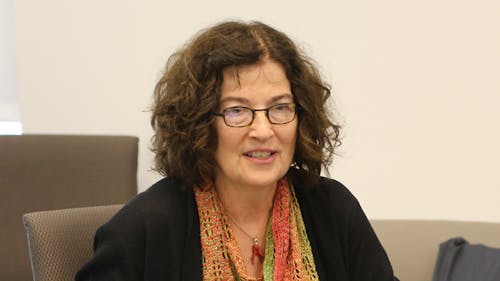Emory U. professor talks about religion’s impact on public health

Discussing various physical and mental effects of religious affiliation and the lack thereof, Emory University professor Ellen L. Idler presented research from her new book Thursday afternoon.
Idler is also the director of the Religion and Public Health Collaborative and professor in the Department of Sociology at Emory in Atlanta, Georgia. She returned to Rutgers, where she worked five years ago, for a presentation at the Institute for Health, Health Care Policy and Aging Research in downtown New Brunswick.
Idler discussed the need to consider religion in public health — the central issue addressed in her latest book, “Religion as a Social Determinant of Public Health.”
“The social determinants of health perspective is the paradigm in public health these days … I think most people in public health recognize that income inequality, political inequality and the distribution of resources in societies [are] the major [determinants] of major health disparities,” Idler said.
She felt her group at Emory found it very important to say religion is one of the social circumstances that could have a very profound impact on health and that it must be taken into account.
Working with 34 other authors, she condensed her 27-chapter work into a multi-part analysis encompassing religious practices, religion’s history in public health, religion and public health on the global landscape and contemporary challenges to public health.
During her seminar, Idler introduced the concept of religion as a fundamental institution that effectively protects individual health.
“From the perspective of studies in the U.S, Europe and Asia, there is really no question that religion has a [health] protective affect and that those who are religious tend to live longer,” she said.
In order to support this assertion, Idler presented information from a study from the University of Texas that established a strong relationship between religious affiliation and mortality rates of individuals.
Limiting participants to choose whether they regularly attend religious services (approximately once per week), the study concluded those who are “religious” have an approximated seven-year life expectancy advantage over those who are not.
She then explained why that conclusion is not particularly shocking.
“[This is] not mysterious. It’s … the case that people who are religiously involved are less likely to be smokers, less likely to have several sexual partners, more likely to have their seatbelt on … there are a lot of protective practices that seem to coincide with religious affiliation,” she said.
In essence, Idler believes the life expectancy advantage of religious people is causational and attributed to certain practices or prohibitions.
Seventh-day Adventists, for instance, tend to outlive a majority of the population because they are prohibited from drinking alcohol and smoking and engage in a vegetarian diet.
The Church of Jesus Christ of Latter-day Saints also forbids the consumption of caffeinated beverages, alcohol and tobacco.
Along with abstaining from such lifestyle choices, Idler points to other practices such as male circumcision in Judaism leading to lower risks of cervical cancer in the partners of circumcised men.
While there certainly are religious practices that are detrimental to individual health, such as Vitamin D deficiency in veiled Islamic women, Idler believes the benefits outweigh the disadvantages considerably.
“Religions tie low-risk aspects of life together and reinforce them,” Idler said.
Along with the interesting statistics and research conclusions presented in the book, one of the more illuminating aspects of her publication is its interdisciplinary content.
Among the 35 authors, Idler was able to solicit writers from every division at Emory, except its School of Business, in 27 chapters.
Stephen Crystal, director of the Center for Health Services Research on Pharmacotherapy at the Institute, found this to be particularly interesting.
“[Ellen has] taken her work in a more global direction, which I thought was fascinating because often times, we put a U.S.-specific lens on this type of research,” Crystal said. “Talk about interdisciplinary — she’s got an intellectual collaborative going here.”
As a professor at the Institute, Crystal felt the open-forum nature of both Idler’s seminar and the book was extremely suitable for the discussion at hand.
Along with Crystal, Carol Boyer, associate director of the Institute, was also pleased with Idler’s seminar, as she was the one who organized this installment of the Institute’s “Brown Bag Seminar Series.”
Boyer said Idler sensitized her to the breadth of religious practices and the positive impact they have on health, their negative effects and also the reforms that might have to take place and could affect both theology and its practice.
Study after study shows that religious affiliation does impact one’s physical and mental condition in a positive manner and that, on a grand scale, those who are religious live longer than those who are not.
“Religious groups often provide social connections, especially for elderly people, people living in disadvantaged communities and so forth,” Idler said. “There’s a certain health-protective effect that I saw consistently in my studies. It’s also important to think of religious institutions as providers of social capital.”



